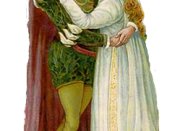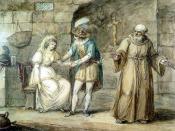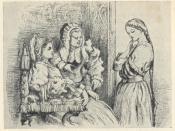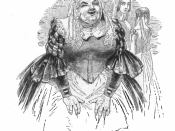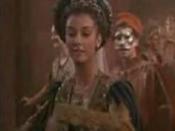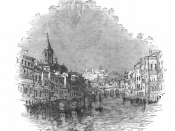'Romeo and Juliet' is a romantic tragedy. The play concerns a pair of 'star cross'd lovers', Romeo from the Montague's and Juliet of the Capulet's. The two families have been feuding for many years and are sworn enemies. In the Elizabethan times it would have not been typical for children to disregard their parent's wishes in matters up to love and marriage and in respect to this story; the coming together of 'Romeo and Juliet' can never run smoothly.
Tragedy involves some hideous events, often death and this is what intensifies the story of 'Romeo and Juliet', in that love implies happiness and joy, whereas tragedy or death is at the contradictory end of the emotional scale.
Elizabethans believed in fate, death, and astrological predictions. Elizabeth I, for instance, had her own astrologist who she often turned to for advice and guidance. When he audience are told in the prologue that the lovers are 'star cross'd lovers' they realize immediately that fate and destiny has decreed their demise.
At the beginning of the play, Mercutio talks about Romeo's perception of love. Mercutio expresses Romeo's perception when he says:
"And, to sink it in should you burden love, too great oppression for a tender thing"
Mercutio is talking about how distressed Romeo feels about his love for Rosaline and how Romeo is therefore questioning his love for her and their destiny. The words 'too great oppression' evokes the image of Romeo's love being painful and hurtful. To emphasise this idea of a boisterous person a simile is used. This elicits the idea that Romeo is confused and is doubting 'Love' and therefore suggest that the love he has for Rosaline cannot be true love as his state of mind is not typical of a person in love. This also suggests that Romeo's love was never running smoothly from the start of the play.
Furthermore in the play, Romeo's father also expresses his worry for Romeo and his strange demeanour. He mentions Romeo's actions to Benvolio when he says that he:
"Shuts up his windows, locks fair daylight out, and makes himself an artificial night."
Romeo is distressed about his love for Rosaline and he is therefore locking himself away from his family and friends. The words 'artificial night' evokes the image that he is trying to fake darkness and does so by stopping all 'daylight'. This quotation adds imagery of darkness and light, which is repeated throughout the play. Here, Romeo would rather be in the dark, away from those that love him. This elicits the idea that he is depressed and miserable and therefore suggests that the love he has cannot be true love as his state of mind is not typical of a person in love.
When Romeo first sees Juliet at the Gala ball he is immediately smitten, and says:
"O she doth teach the torches to burn bright,"
"Did my heart love till now? Forswear it; I ne'er saw true beauty till this night."
Here Romeo is comparing Juliet to Rosaline who he thinks pales in comparison to the former. The phrase 'Did my heart love till now' indicates that he realises he was not really in love with Rosaline. The expression 'O she doth teach the torches to burn bright' is a metaphor extolling the beauty of Juliet indicating that she is radiant and glowing.
At this point in the play Romeo has not spoken to Juliet so that the attraction he has for her can only be physical, but he has already forgotten about Rosaline, so enchanted is he with Juliet's beauty.
When Romeo starts talking to Juliet it becomes obvious that his love for her is immediately reciprocated whereas when he loved Rosaline it was unrequited love. Romeo has changed from a callow youth into a tender, loving suitor. The love 'Romeo and Juliet' have for each other is powerful as evidenced by:
"Give me my sin again"
This suggests that at this point in the play, love seems to be running smoothly because Romeo wants to kiss Juliet again. This is the proof that there love seems to be mutual.
In the famous balcony scene, Romeo tempts fate for the path of his love. He conveys his feelings about the love he has for Juliet when he says:
"My life were better ended by their hate than death prorogued wanting of thy love"
Romeo's strong passionate love for Juliet is so powerful that Romeo is willing to get caught by the guards rather than wait for her love. The phrase 'death prorogued' suggests Romeo is tempting fate. There fate is death and an Elizabethan audience would have known this because they were told this in the prologue. An Elizabethan audience would have taken into consideration that it wasn't fate it was a premonition. This educes the idea that the strength of his love is so pervasive that he's willing to die for her. Here in the play things are going so well between 'Romeo and Juliet' that nothing could go wrong. Could it?
Later on in the play their true love starts to not run smoothly because of Romeo's reaction to the result of his cousin dying. After Romeo's sentence of banishment has been passed Romeo goes to see Friar Laurence and says:
"Ha banishment! Be merciful, say death"
Romeo has been banished from Verona and is therefore consulting Friar Laurence about what's going to happen to his marriage with Juliet. The expression 'Be merciful' implies that Romeo is asking for pity and forgiveness. In other words Romeo is saying that he would rather die than not see Juliet again. The phrase 'say death' suggests that Romeo is tempting fate once again. An Elizabethan audience would have known that his fate is 'death'. Currently in the play we know that Romeo's love is not running smoothly because 'Romeo and Juliet' have been separated from each other and may not see each other again.
Near the end of the tragedy Romeo talks about the result of killing Tybalt. He starts to blame Juliet for his actions when he says:
"Thy beauty hath made me effeminate"
Romeo is distressed once again about what falling in love with Juliet has resulted into. He is saying that the love he has for her has made him softer and so he will not fight after being challenged by Tybalt. This is because of the love he has for Juliet; he cannot fight Tybalt as Tybalt is Juliet's cousin. This suggests that Romeo's love isn't running smoothly at this part in the tragedy because he is blaming Juliet for becoming feminine.
In the following scene we learn that Juliet cannot turn off the love she has for Romeo, even after knowing that Romeo has killed Tybalt. After learning what Romeo has gone and done Juliet says:
"A damned saint, an honourable villain!"
Juliet's love for Romeo is so powerful that Juliet is not being able to turn it off. The phrase 'saint' evokes the idea of religion. The love she has for him is religious. The words 'saint' and 'honourable' is an oxymoron which shows the confusion and the doubted feelings for Romeo. The phrase 'villain' suggests that Juliet believes Romeo has committed a murder, a great sin. Shakespeare uses contrasts the words 'saint' and 'honourable' to the words 'dammed' and 'villain' to show the extent of what Romeo can do but Juliet cannot turn off her love for him. This elicits the idea that from the point of Juliet love is running smoothly whereas the love Romeo had for Juliet was not running smoothly.
Not only have the deaths of Tybalt and Mercutio affected the course of true love between 'Romeo and Juliet' but Romeo's constant challenging of fate itself is shown, when he says:
"Then I defy you, stars!"
The Elizabethan audience, hearing this, would have reacted by fearing that Romeo is trifling with fate. Since Friar Laurence's letter didn't reach Romeo he was not aware of the plan. Fate has also intervened once again to disrupt the course of true love. So love is not running smoothly. Romeo's ignorance of the plan culminates in him committing suicide and Juliet's awareness is to discover everything has gone wrong, also leads to her death.
Therefore the deaths of the 'star cross'd lovers' are fate's final blow. As suggested by the princes comment:
"That heaven finds means to kill your joys with love"
Here the price is personifying 'heaven' as fates tool. The prince is also touched by tragedy he has lost 'a brace of kinsmen.' Everyone has been punished. The quote above brings home the dreadful tragedy that love has resulted in death. Their 'joys' have been killed by this twist of fate and what should have been a happy ending has turned into a tragedy. Obviously the course of true love does not run smoothly for Romeo because his wife is dead as far as he is concerned, results in him committing suicide and this is why the course of true love for Romeo does not run smoothly.
By covering these points we would have known from the start that the course of true love tends to not have run smoothly throughout this play. Firstly because Romeo's first love was unrequited love and his second love was to a feuding family.
